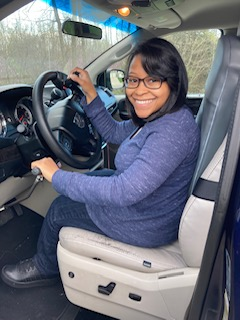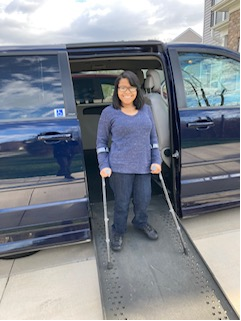
Amanda Spain is used to advocating for herself. A nonprofit professional based in Greensboro, Amanda came to Self-Help after a lengthy search for a financial institution that would help her increase her mobility and independence with affordable financing for a wheelchair-accessible vehicle.
Through good money management practices and a supportive family, Amanda was able to graduate college without debt. But like many young people, her prudent financial decisions also left her with no credit history, making it difficult to get a loan for the equipment she needed to navigate her daily commute and social life.
As Amanda advanced in her career, she realized she needed a vehicle upgrade. After finding a better van, she began looking for financing that included the wheelchair accessibility conversions she needed.
Finding a willing financial partner proved challenging. Amanda found that while accessibility conversions add value to vehicles, many lenders don’t include the cost of the conversions in their valuations, which requires borrowers to pay out of pocket to meet their routine accessibility needs.
“Conversions aren't optional pieces for us; we can't buy a car off the lot,” she notes. Her lack of credit, too, only made it harder to convince banks to take a chance on her.
Undeterred, Amanda kept pursuing her goal. Her extensive knowledge of the resources available to people with disabilities and her positive outlook helped her persist even when bank after bank turned her away. Amanda was aware of the challenges she’d have to face, and at the same time knew there had to be another option. “I’ve always had a ‘you have not because you’ve asked not’ attitude,” she says.
At the suggestion of the new vehicle’s seller, Amanda reached out to Tamara Pereboom at the North Carolina Assistive Technology Program — a Self-Help partner — who told Amanda about Self-Help’s low interest rate loans for assistive technology devices.
Self-Help is currently one of just a few financial institutions to offer assistive technology loans to North Carolina residents, and we hope to expand the program to other states in the future. These loans can be used for the purchase of almost any device or equipment that will enhance the quality of life for a person with disabilities.

Kimberly Williams, Self-Help’s Assistive Technology (AT) loan program manager, worked with Amanda through the lending process. Kimberly finds motivation and joy in working with AT loan borrowers.
“The assistive technology program is the best part of my job. It's the part of my job I'm most passionate about because of the impact Self-Help can have,” she says.
With no credit history, Amanda’s most realistic option from Self-Help was a first-time auto buyers loan at a higher interest rate. While Amanda was prepared for this, it wasn’t ideal, as she’d still have to pay for the necessary wheelchair accessibility conversions out of pocket.
At the last minute, however, Amanda got a call from Kimberly, telling her that Self-Help would approve the assistive technology loan she’d applied for. “I was in tears,” she recalls. “This loan was a game-changer. Having the valuation with conversions plus the lower interest rates was huge.”
With an upgraded and converted van, Amanda now drives to work confidently without worrying about blind spots as much as she used to, and she can spend more time out with friends who also require wheelchair accessibility. Amanda was also able to gift her previous van to a friend who is a new driver and needed a converted vehicle.
For others in her position, Amanda stresses the importance of access to financing for vehicles with accessibility conversions. “People need to know that this is out there. None of my friends knew about either Self-Help or assistive technology loans, so I've been able to tell my friends that this is out there for us. This makes our dreams of being more independent more possible.”